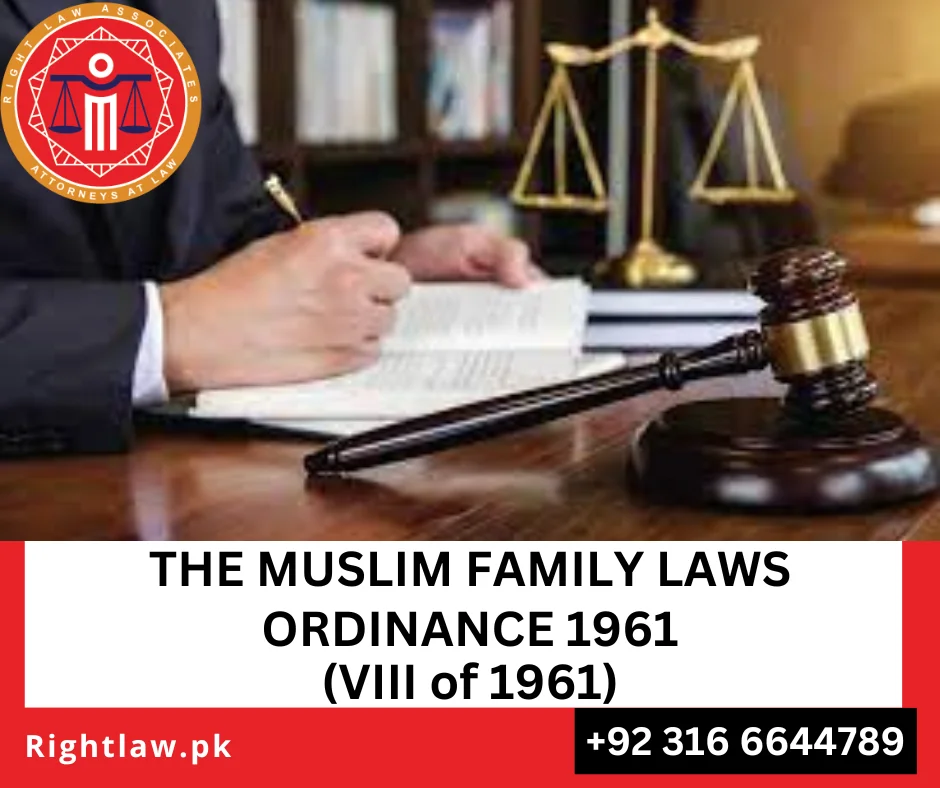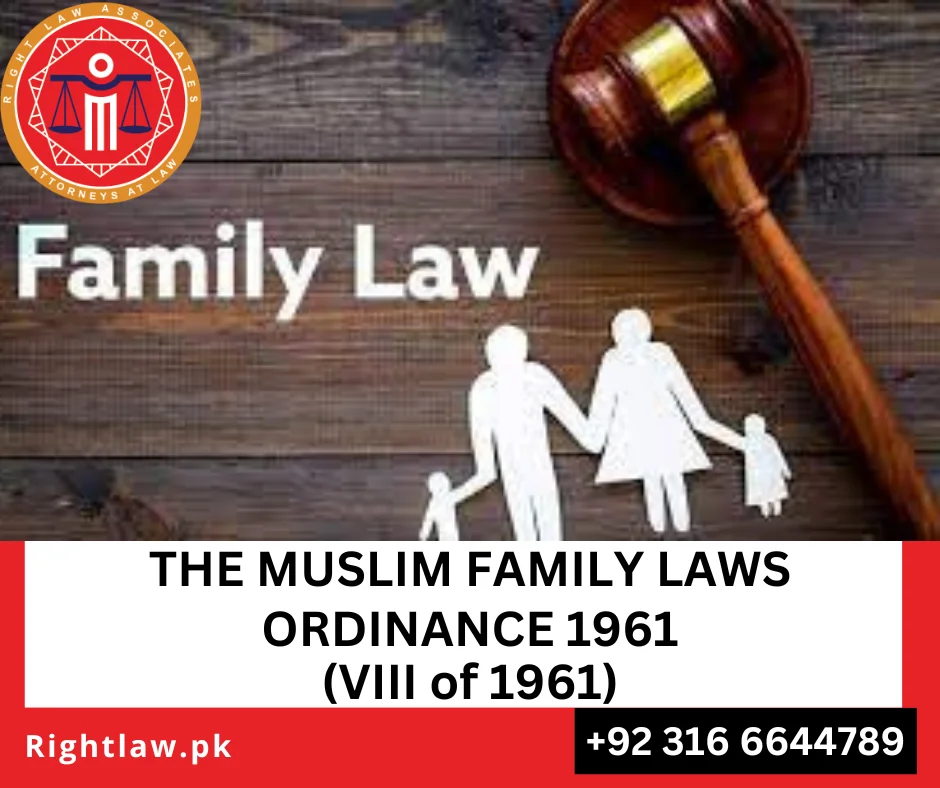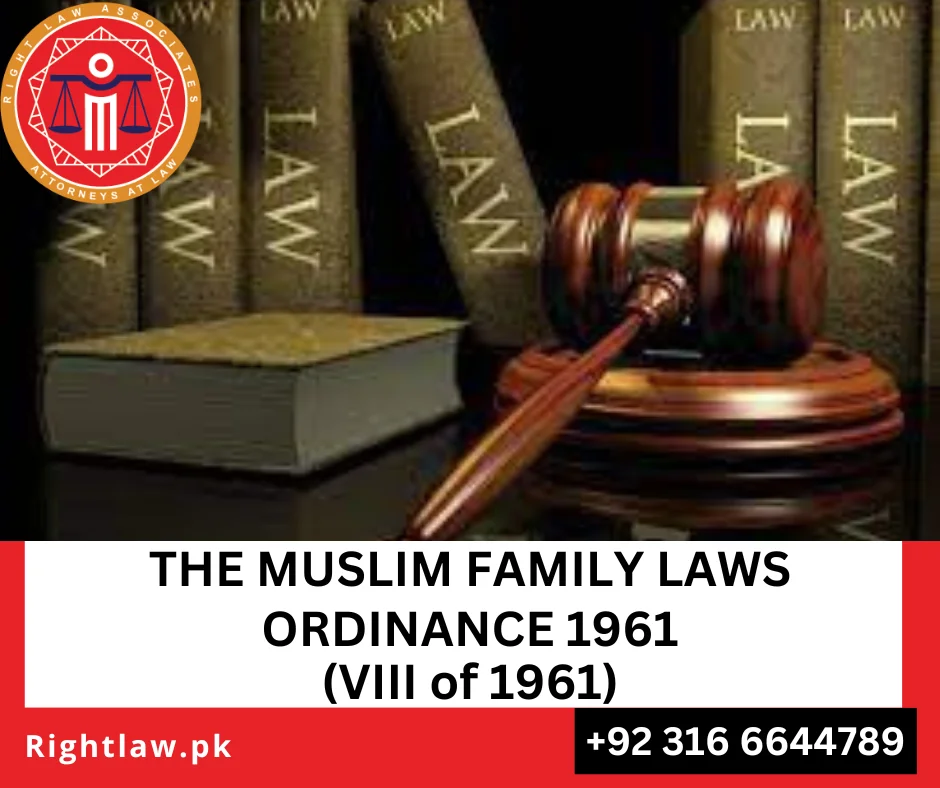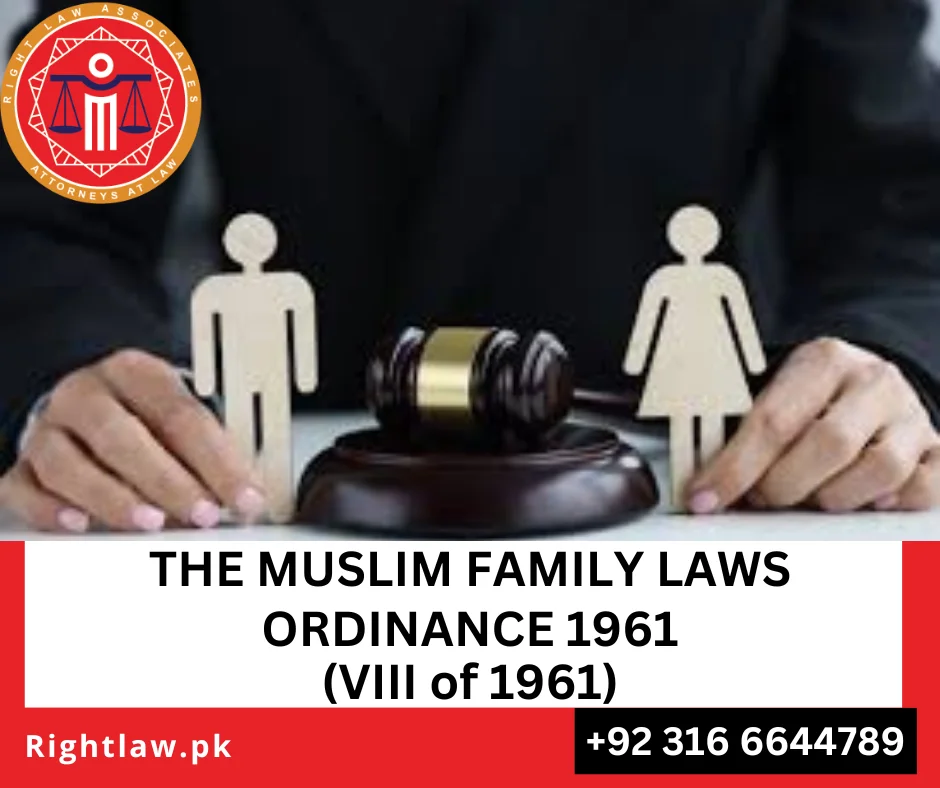- Karachi
- Lahore
- Islamabad
- Leads, UK
- Reading, UK
- Quebec, Canada
Family Law in Pakistan-The Muslim Family Law Ordinance 1961
Mohsin Ali Shah, Chairman Qanoon Group, Pakistan
Family Law in Pakistan - Muslim Family Law Ordinance
Short title, extent, application and commencement.
- Definitions.
- Ordinance to override other laws, etc.
- Succession.
- Registration of marriages.
- Polygamy.
- Talaq.
- Dissolution of marriage otherwise than by talaq.
- Maintenance.
- Dower.
- Power to make rules.
- [Omitted]
- [Omitted]
1]THE MUSLIM FAMILY LAWS ORDINANCE 1961
(VIII of 1961)
[2nd March 1961]
An Ordinance to give effect to certain recommendations of the Commission on Marriage and Family Laws
WHEREAS it is expedient to give effect to certain recommendations of the Commission on Marriage and Family Laws;
NOW, THEREFORE, in pursuance of the Proclamation of the seventh day of October, 1958, and in exercise of all powers enabling him in that behalf, the President is pleased to make and promulgate the following Ordinance:
- Short title, extent, application and commencement.– (1) This Ordinance may be called the Muslim Family Laws Ordinance, 1961.
(2) It extends to the whole of [2][the Punjab], and applies to all Muslim citizens of Pakistan, wherever they may be.
[3][(3) It shall come into force at once.]

[4][2. Definitions.- In this Ordinance:
(a) “Arbitration Council” means a body consisting of the Chairman and representative of each of the parties to a matter under the Ordinance; and, in case any party fails to nominate a representative within the prescribed time, the body formed without such representative shall be the Arbitration Council;
(b) “Chairman” means the Chairman of a Union Council, Union Administration or Municipal Committee or any officer authorized by the Government to discharge the functions of the Chairman under the Ordinance and where the Chairman is a non-Muslim or he himself wishes to make an application to the Arbitration Council, or is, owing to illness or any other reason, unable to discharge the functions of the Chairman, the Arbitration Council shall select one of its Muslim members as Chairman;
(c) “Government” means Government of the Punjab;
(d) “prescribed” means prescribed by rules made under this Ordinance; and
(e) “Union Council” means a Union Council, Municipal Committee, Cantonment Board, a Union Administration or, in case of absence of any of these local governments in a local area, any other comparable body constituted under any law relating to the local governments or local authorities.]
- Ordinance to override other laws, etc.– (1) The provisions of this Ordinance shall have effect notwithstanding any law, custom or usage, and the registration of Muslim marriages shall take place only in accordance with those provisions.
(2) For the removal of doubt, it is hereby declared that the provisions of the Arbitration Act, 1940[5], the Code of Civil Procedure, 1908[6], and any other law regulating the procedure of courts shall not apply to any Arbitration Council.
- Succession.– In the event of the death of any son or daughter of the propositus before the opening of succession, the children of such son or daughter, if any, living at the time the succession opens, shall per stirpes receive a share equivalent to the share which such son or daughter, as the case may be, would have received if alive.
- Registration of marriages.– (1) Every marriage solemnized under Muslim Law shall be registered in accordance with the provisions of this Ordinance.
[7][(2) For the purpose of registration of marriages under this Ordinance, the Union Council shall grant licenses to one or more persons, to be called Nikah Registrars.]
[8][(2A) The Nikah Registrar or the person who solemnizes a Nikah shall accurately fill all the columns of the Nikahnama form with specific answers of the bride or the bridegroom.]
(3) Every marriage not solemnized by the Nikah Registrar shall, for the purpose of registration under this Ordinance, be reported to him by the person who has solemnized such marriage.
[9][(4) If a person contravenes the provision of:
(i) subsection (2A), he shall be punished to simple imprisonment for a term which may extend to one month and fine of twenty five thousand rupees; and
(ii) subsection (3), he shall be punished to simple imprisonment for a term which may extend to three months and fine of one hundred thousand rupees.]
(5) The form of nikahnama, the registers to be maintained by Nikah Registrars, the records to be preserved by Union Councils, the manner in which marriages shall be registered and copies of nikahnama shall be supplied to the parties, and the fees to be charged therefor, shall be such as may be prescribed.
(6) Any person may, on payment of the prescribed fee, if any, inspect at the office of the Union Council the record preserved under sub-section (5), or obtain a copy of any entry therein.
- Polygamy.– (1) No man, during the subsistence of an existing marriage, shall, except with the previous permission in writing of the Arbitration Council, contract another marriage, nor shall any such marriage contracted without such permission be registered under this Ordinance.
(2) An application for permission under sub-section (1) shall be submitted to the Chairman in the prescribed manner, together with the prescribed fee, and shall state reasons for the proposed marriage, and whether the consent of existing wife or wives has been obtained thereto.
(3) On receipt of the application under sub-section (2), the Chairman shall ask the applicant and his existing wife or wives each to nominate a representative, and the Arbitration Council so constituted may, if satisfied that the proposed marriage is necessary and just, grant, subject to such conditions, if any, as may be deemed fit, the permission applied for.
(4) In deciding the application, the Arbitration Council shall record its reasons for the decision, and any party may, in the prescribed manner, within the prescribed period, and on payment of the prescribed fee, prefer an application for revision [10][to the Collector] concerned and his decision shall be final and shall not be called in question in any Court.
(5) Any man who contracts another marriage without the permission of the Arbitration Council shall,
(a) pay immediately the entire amount of the dower, whether prompt or deferred, due to the existing wife or wives, which amount, if not so paid, shall be recoverable as arrears of land revenue; and
[11][(b) on conviction upon complaint be punishable with the simple imprisonment which may extend to one year and with fine of five hundred thousand rupees.]

- Talaq.– (1) Any man who wishes to divorce his wife shall, as soon as may be after the pronouncement of talaq in any form whatsoever, give the Chairman notice in writing of his having done so, and shall supply a copy thereof to the wife.
(2) Whoever, contravenes the provisions of sub-section (1) shall be punishable with simple imprisonment for a term which may extend to one year, or with fine which may extend to five thousand rupees, or with both.
(3) Save as provided in sub-section (5), a talaq, unless revoked earlier, expressly or otherwise, shall not be effective until the expiration of ninety days from the day on which notice under sub-section (1) is delivered to the Chairman.
(4) Within thirty days of the receipt of notice under sub-section (1), the Chairman shall constitute an Arbitration Council for the purpose of bringing about a reconciliation between the parties, and the Arbitration Council shall take all steps necessary to bring about such reconciliation.
(5) If the wife be pregnant at the time talaq is pronounced, talaq shall not be effect until the period mentioned in sub-section [12][(3)] or the pregnancy, whichever be later, ends.
(6) Nothing shall debar a wife whose marriage has been terminated by talaq effective under this section from remarrying the same husband, without an intervening marriage with a third person, unless such termination is for the third time so effective.
- Dissolution of marriage otherwise than by talaq.– Where the right to divorce has been duly delegated to the wife and she wishes to exercise that right, or where any of the parties to a marriage wishes to dissolves the marriage otherwise than by talaq, the provisions of section 7 shall, mutatis mutandis and so far as applicable, apply.
- Maintenance.– (1) If any husband fails to maintain his wife adequately, or where there are more wives than one, fails to maintain them equitably, the wife, or all or any of the wives, may, in addition to seeking any other legal remedy available, apply to the Chairman who shall constitute an Arbitration Council to determine the matter, and the Arbitration Council may issue a certificate specifying the amount which shall be paid as maintenance by the husband.
[13][(1A) If a father fails to maintain his child, the mother or grandmother of the child may, in addition to seeking any other legal remedy, apply to the Chairman who shall constitute an Arbitration Council and the Arbitration Council may issue a certificate specifying the amount which shall be paid by the father as maintenance of the child.]
(2) A husband or wife may, in the prescribed manner, within the prescribed period, and on payment of the prescribed fee, prefer an application for revision of the certificate, [14][to the Collector] concerned and his decision shall be final and shall not be called in question in any Court.
(3) Any amount payable under sub-section (1) or (2), if not paid in due time, shall be recoverable as arrears of land revenue [15][:]
[16][Provided that the Commissioner of a Division may, on an application made in this behalf and for reasons to be recorded, transfer an application for revision of the certificate from a Collector to any other Collector, or to a Director, Local Government, or to an Additional Commissioner in his Division.]

- Dower.– Where no details about the mode of payment of dower are specified in the nikahnama or the marriage contract, the entire amount of the dower shall be presumed to be payable on demand.
- Power to make rules.- (1) The [17][[18][Federal Government] in respect of the Cantonment areas and the Provincial Government in respect of other areas] may make rules to carry into effect the purposes of this Ordinance.
(2) In making rules under this section, [19][such Government] may provide that a breach of any of the rules shall be punishable with simple imprisonment which may extend to one month, or with fine which may extend to two hundred rupees, or with both.
(3) Rules made under this section shall be published in the official Gazette, and shall thereupon have effect as if enacted in this Ordinance.
[20][12. * * * * *]
[21][13. * * * * *]
[1]In pursuance of the Proclamation of the seventh day of October, 1958, and in exercise of all powers enabling him in that behalf, the President of Pakistan was pleased to make and promulgate this Ordinance which was published in the Gazette of Pakistan, 1961 (Extraordinary), dated 15 July 1961, p. 1128.
This Ordinance was originally in the Federal ambit, however, the subject on which this law was enacted devolved to the provinces by virtue of 18th Amendment in the Constitution, hence, it was adapted, with amendments, for the province of the Punjab by the Muslim Family Laws (Amendment) Act 2015 (XIII of 2015).
[2]Substituted for the word “Pakistan” by the Muslim Family Laws (Amendment) Act 2015 (XIII of 2015).
[3]Substituted by the Muslim Family Laws (Amendment) Act 2015 (XIII of 2015) for the following:
“(3) It shall come into force on such date as the [Federal Government] may, by notification in the official Gazette, appoint in this behalf.”
The words in crotchets were earlier substituted for “Central Government” by the Federal Adaptation Order 1975, Art. 2 and Table (w.e.f. 28th July 1975).
[4]Substituted by the Muslim Family Laws (Amendment) Act 2015 (XIII of 2015) for the following:
“2. Definitions.– In this Ordinance, unless there is anything repugnant in the subject or context:
(a) ‘Arbitration Council’ means a body consisting of the Chairman and representative of each of the parties to a matter deal with in this Ordinance:
Provided that where any party fails to nominate a representative within the prescribed time, the body formed without such representative shall be the Arbitration Council;
(b) ‘Chairman’ means the Chairman of the Union Council or a person appointed by the Central or a Provincial Government, or by an officer authorized in that behalf by any such Government, to discharge the functions of Chairman under this Ordinance:
Provided that where the Chairman of the Union Council is non-Muslim or he himself wishes to make an application to ‘the Arbitration Council, or is owing to illness or any other reason, unable to discharge the functions of Chairman, the Council shall select one of its Muslim members as Chairman for the purposes of this Ordinance;
(c) ‘Prescribed’ means prescribed by rules made under section 11;
(d) ‘Union Council’ means the Union Council or the Town Committee constituted under the Basic Democracies Order, 1959 (P.O (No, 18 of 1959), and having in the matter jurisdiction as prescribed;
(e) ‘Ward,’ mean a ward within a Union or Town as defined in the aforesaid Order.”

[5]X of 1940
[6]V of 1908
[7]Substituted by the Muslim Family Laws (Amendment) Act 2015 (XIII of 2015) for the following:
“(2) For the purpose of registration of marriages under this Ordinance, the Union Council shall grant licences to one or more persons, to be called Nikah Registrars, but in no case shall more than one Nikah Registrar be licensed for any one Ward.”
[8]New sub-section (2A) inserted by the Muslim Family Laws (Amendment) Act 2015 (XIII of 2015).
[9]Substituted by the Muslim Family Laws (Amendment) Act 2015 (XIII of 2015) for the following:
“(4) Whoever contravenes the provisions of sub-section (3) shall be punishable with simple imprisonment for a term which may extend to three months, or with fine which may extend to one thousand rupees, or with both.”
[10]Substituted for “, in the case of West Pakistan to the Collector and, in the case of East Pakistan, to the Sub-Divisional Officer” by the Federal Adaptation Order 1975, Art. 2 and Sch (w.e.f. 28th July 1975).
[11]Substituted by the Muslim Family Laws (Amendment) Act 2015 (XIII of 2015) for the following:
“(b) on conviction upon complaint be punishable with simple imprisonment which may extend to one year, or with fine which may extend to five thousand rupees, or with both.”
[12]Substituted for “(2)”, by the Muslim Family Laws (Second Amendment) Ordinance 1961 (XXX of 1961).
[13]New sub-section (1A) inserted by the Muslim Family Laws (Amendment) Act 2015 (XIII of 2015).
[14]Substituted for “, in the case of West Pakistan to the Collector and, in the case of East Pakistan, to the Sub-Divisional Officer” by the Federal Adaptation Order 1975, Art. 2 and Sch (w.e.f. 28th July 1975).
[15]Substituted for the full-stop by the Muslim Family Laws (Punjab Amendment) Act, 1975 (XI of 1975).
[16]Proviso added by the Muslim Family Laws (Punjab Amendment) Act, 1975 (XI of 1975).
[17]Substituted for “Provincial Government”, by the Central Adaptation of Laws Order, 1964, Art 2 & Sch.
[18]Substituted for “Central Government”, by the Federal Adaptation Order 1975, Art 2 and Table (w.e.f. 28th July 1975).
[19]Substituted for “ the Provincial Government”, by the Central Adaptation of Laws Order, 1964, Art 2 & Sch.
[20] The following section 12 omitted by the Federal Laws (Revision and Declaration) Ordinance 1981 (XXVII of 1981), s.3 and Sch II.
“12. Amendment of Child Marriage Restraint Act, 1929 (XIX of 1929).– In the Child Marriage Restraint Act. 1929 (XIX of 1929)-
(1) In section 2; —
(a) in clause (a) for the word ‘fourteen’ the word sixteen’ shall be substituted ;
(b) in clause (c), the word ‘and’ shall be omitted, and
(c) in clause (d), for the full-stop at the end, a comma shall be substituted and thereafter the following new clause (e) shall be added, namely :-
(e) ‘Union Council’ means the Union Council or the Town Committee constituted under the Basic Democracies Order, 1959 (P.O. No. 18 of 1959), within whose jurisdiction a child marriage is or is about to be solemnized.’
(2) Section 3 shall be omitted.
(3) In section 4, for words ‘twenty-one’ the word ‘eighteen’ shall be substituted.
(4) In section 9, after the words ‘under this Act’, the words ‘except on a complaint made by the Union Council, or if there is no Union Council in the area, by such authority as the Provincial Government may in this behalf prescribe, and such cognizance shall in no case be taken’ shall be inserted ; and
(5) Section 11 shall be omitted.”
[21] The following section 13 omitted by the Federal Laws (Revision and Declaration) Ordinance 1981 (XXVII of 1981), s.3 and Sch II.
“13. Amendment of the Dissolution of Muslim Marriages Act, 1939 (VIII of 1939) .– In the Dissolution of Muslim Marriages Act, 1939 (VIII of 1939), in section 2:
(a) After clause (ii), the following new clause (ii-a) shall be inserted, namely
“(ii-a) that the husband has taken any additional wife in contravention of the provisions of the Muslim Family Laws Ordinance, 1961;” and
(b) In clause (vii), for the word ‘fifteen’ the word ‘sixteen’ shall be substituted.”
Legal Services
- Divorce Law
- Child Custody
- Family Law
- Financial Law
- Civil Legalation
Syed mohsin Ali Shah
Phone : +92316-6644789
Let's Connect
- 0333 1127835
- [email protected]
- M-51, M-52, Muneer Mobile Mall, Near Perfume Chowk Jauhar Chowrangi, Block 17, Gulistan-e-Jauhar, Karachi, Pakistan.
- Suite No. 5, 2nd Floor, Laraib Centre, Mangla Road, Karachi Company, G-9 Markaz, Islamabad Pakistan
-
NADRA Divorce Certificate Services in Pakistan
-
NADRA Birth Certificate Services in Pakistan
-
Court Marriage with Full Privacy Assurance
-
Court Marriage for Couples Seeking Legal Union
-
Court Marriage in Pakistan: Court Marriage Process & Fees
-
Court Marriage: Confidential & Hassle-Free Solutions
-
Trend of Court Marriage in Pakistan: Court Marriage's Reasons
-
Court Marriage Services in Karachi, Lahore, Islamabad, and Rawalpindi
-
Understanding Court Marriage in Pakistan: A Guide to Court Marriage
-
Best Family: What Makes a Family Truly Great
-
Divorce Papers in Pakistan: Divorce Deed and NADRA Divorce Certificate
-
Court Marriage in Pakistan: Procedure and Fees
-
Court Marriage in Lahore: Our Court Marriage Service in Lahore
-
Nikah Khawan and Nikah Registrar Services in Karachi, Pakistan
-
Family Law in Pakistan-The Muslim Family Law Ordinance 1961
-
Understanding Online Nikah: The Crucial Roles of Nikah Khawan and Nikah Registrar
-
Nikah Khawan and Nikah Registrar Services in Pakistan
-
Lawyers Help for Court Marriage Procedure in Karachi
-
Online Marriage in Islam: Muslim Online Marriage
-
Court Marriage in Pakistan—Legal Procedure, Social Realities, and Support for Couples
-
Court Marriage, Online Marriage, and Nikah-Khawan Services in Islamabad & Rawalpindi
-
Online Marriage/Nikah | Online Marriage/Nikah Services In and From Pakistan
-
Nikah Khawan/Qazi Services and Fees in Karachi-Lahore-Islamabad/Rawalpindi-Faisalabad-Multan
-
Court Marriage Pakistan | Court Marriage Services-Process-Fees in Pakistan
-
Embracing Online Marriage Services Across Karachi, Lahore, Islamabad, and Rawalpindi, Pakistan
-
Family Law | Expert Divorce Lawyers For Khula/Talaq (Divorce) in Karachi, Islamabad/Rawalpindi & Lahore, Pakistan
-
Guardianship Lawyers in Karachi, Lahore, & Islamabad Pakistan
-
Child Custody Lawyers in Karachi, Lahore, & Islamabad-Pakistan
-
English Nikah Nama | English Nikah Nama Available in Karachi
-
Family Law | Expert Divorce Lawyers For Khula/Talaq (Divorce) in Karachi, Islamabad/Rawalpindi & Lahore, Pakistan
-
Nikah Nama Urdu/English Available in Karachi
-
Nadra Marriage Registration Service | Marriage Registration Certificate
-
Marriage Registration | Nadra Marriage Certificate-Karachi
-
Nikah Nama Services with Nikah Nama English & Urdu
-
Nikah Registration | Nikah Registration Services-Pakistan
-
What is Child Guardianship
-
Top Rated Advocates for Family Law Matters
-
B Form NADRA: Importance of B Form in Pakistan
-
Nadra B Form in Pakistan
-
Is Court Marriage Legal in Pakistan
-
Child Maintenance Advocates in Karachi
-
Consumer Rights Advocates in Karachi
-
Best Leady Lawyer Expertise as a Family Court Lawyer
-
Online Nikah Marriage In Pakistan
-
Business Corporate lawyers in Pakistan
-
Criminal Lawyers in Karachi | Lahore | Islamabad Rawalpindi | Pakistan
-
Understanding Business Law Corporate Lawyers Services in Pakistan
-
Online Marriage Technology in Modern
-
Court Marriage Professional Lawyers in Lahore
-
Court Marriage in Pakistan and Civil Marriage: Right Law Firm
-
Property Lawyers in Pakistan
-
Property Lawyers Expert in Pakistan
-
Minimum Wage in Pakistan
-
Property Disputes a Comprehensive Guide
-
Child Adoption Procedure & Services in Pakistan
-
Legally Valid Online Nikah, Your Love Story with Online Marriage
-
Online Nikah Excellence Pioneering Legally Sound Online Marriage
-
Court Marriage the Effortless Formality
-
Court Marriage in Pakistan-No.1 Court Marriage Service in Karachi
-
Navigating the Path to Legal Unions, Court Marriage in Pakistan
-
Court Marriage, Empowering Personal Choice and Freedom
-
Trusted Court Marriage Law Firm
-
Court Marriage a Journey Court Marriage in Pakistan
-
Power of Nikah Certificates
-
Nikah Certificates-Legality in Pakistan
-
Adoptions and Adoptive Families in Pakistan
-
Court Marriage in Pakistan A Comprehensive Guide
-
<strong>Tax Lawyer Mohsin Ali Shah</strong>
-
Civil Lawyers The Importance of Evidence in Civil Cases-Expert Tips for Civil Lawyers
-
Can There Be Objections to a Public Party Following a Court Marriage.
-
Court Marriage Making Love Officially Recognized Via Court Marriage
-
Court Marriage, Civil Marriage & Online Nikah in Pakistan
-
Misyar Marriage Nikah Misyar Facts About Misyar Marriages
-
Online Nikah and Online Marriage in Pakistan
-
The government of Pakistan amended the Civil and Criminal Law to bring reforms in Justice System
-
Child Adoption & Guardianship in Pakistan
-
Restitution of Conjugal Rights
-
Difference between Divorce Talaq and Khula:
